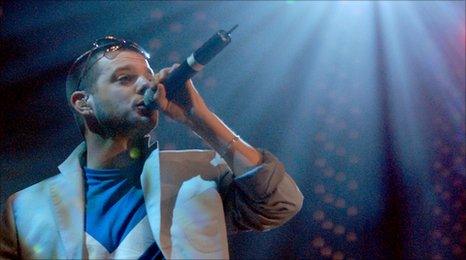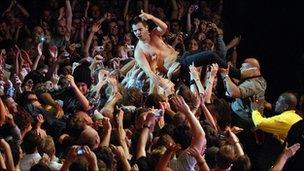Mike Skinner not sad at The Streets' demise
- Published

Mike Skinner says he has no regrets about the end of The Streets, culminating in the release of his fifth album Computers and Blues.
"I don't feel any sadness, I would feel frustrated if I had to make another one."
Speaking to Mark Lawson on BBC Radio 4's Front Row, the musician says: "You can't go on forever, can you?"
And he has no idea musically what he will do next.
"No I don't know, this album has been a real test for me. I guess just coming off the back of doing it for 10 years."
The rapper, musician and record producer released his debut album, Original Pirate Material under the name The Streets in 2002.
He recently said he was "too old" for The Streets, but denies saying he was tired of his musical alter ego.
"I didn't say I was sick of The Streets... I totally believe in this (album). I think every single song on that album is a really good song.
"But at the same time I don't want to do it any more. I don't think there's anything wrong with saying that. I don't think it's a negative thing to say."
The Streets originally started out as a group project, but other members drifted away and Skinner used guest vocalists on his albums.
Sci-fi future
"The way that I've made all my music is I've done it all myself. This album more than the first one - it was written by me, it was engineered by me, it was recorded by me, it was mixed by me and it was mastered by me. As far as I'm aware no-one else in the world does that."

Skinner has toured the world as The Streets
He says there is no relevance to The Streets' five-album lifespan.
"The significance is down to the record deal I did with Warner but it worked out well because it just feels natural, it feels like I've explored every idea that I have in me for it."
This album has been called possibly his best yet. Much of it is about the effect of technology on relationships.
"Originally when I started the album I imagined it would be some kind of JG Ballard meets Blade Runner kind of dystopian sci-fi future, but fairly quickly I realised I was narrowing down my options too much.
"So I did write songs about robots but then a few songs came along that were really good. The first one was Blip on a Screen which is about going to an ultrasound scan of my daughter.
"That was the first moment when it felt I was writing about technology and the future, but it also feels like a human love story."
Skinner's future includes a farewell Streets tour, writing his life story and making a film.
"My mind is occupied with touring the Streets, that will take up to a year and then we're writing a film at the moment so all the visual stuff I do on my website is taking up all of my creative passion now."
He wants to point out the book will not be an autobiography as his friend is writing it with him.
"We're writing my story but we're doing it together. If I write something I tend to think about the words too much and it ends up being quite dense.
"But this book will be my story but my verbal style and because that's essentially what it is, it's an interview. I'm writing a book by proxy in that sense."
Skinner's move into the movie industry will be a low-budget affair. The project is a co-production with two of his friends and regular collaborators and he's been buying cinema quality cameras and lenses in preparation.
He will star in the thriller set in a hospital, but says they will be taking their time over it.
'No Martin Scorsese'
"The idea that you have this six weeks in order to make a film I find really terrifying.
"So we'd rather take two years and almost write it while we shoot it and have the freedom to redo stuff and come back to it and completely rewrite things."
"And that's the way I've always made music. If I'd have done that album in a professional studio it would have cost millions because I was in the studio every day for years. And it's £1,000 a day in any decent studio."
As for its release he isn't worried about how many people get to see it.
"We probably won't get many screens because it's not like I'm Martin Scorsese or anything, so whatever really."
You can hear the full interview with Mike Skinner on Front Row, Monday 7 February at 1915 GMT.